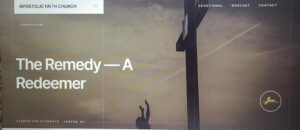
God’s commandment was clear and plain. Adam could eat fruit of any of the trees in the Garden except the tree of the knowledge of good and evil, “for in the day that thou eatest thereof thou shalt surely die.” Adam disobeyed God and ate of that tree. Spiritually, he died immediately. Physically, he died some years later. The curse of sin passed upon Adam and all future mankind. The situation would have been hopeless, except for God’s love and grace. Along with the curse upon sin, God promised a Redeemer—our Lord Jesus Christ.
QUESTIONS
- The word redeem means, “to buy back, repurchase, or free from the bondage of sin.” Review the previous lesson, and in your own words briefly summarize why there was a need for redemption.
- “All have sinned, and come short of the glory of God” (Romans 3:23). This being true, who then can be redeemed? See John 3:17; Romans 5:17; 1 Peter 1:17; and 2 Peter 3:9.
- There are those who think they can purchase their own redemption by giving largely to religious organizations or worthwhile charitable concerns. Others may depend on their own good works or their adherence to certain rules of conduct to make their way into Heaven. Read 1 Peter 1:18-19 and describe how the Bible says we receive redemption.
- In what unique way does Jesus Christ qualify to be our Redeemer? Use 2 Corinthians 5:21 and 1 Peter 1:19 to help you with your answer.
- When was Jesus Christ foreordained as our Redeemer from sin?
- How does the Apostle Peter compare the life span of man with the grass of the field? What does this have to do with redemption?
- The disobedience of Adam in the Garden caused the curse of sin to pass upon all men. The obedience of Jesus Christ brought redemption, or righteousness, to all who believe in Him. How can one avail himself of this redemption?
- What is the end result of our righteousness through Christ Jesus, if we remain faithful? See Romans 5:21. Find another verse in the Bible which gives a parallel promise.
- How does Matthew 16:26 relate to man’s redemption?
